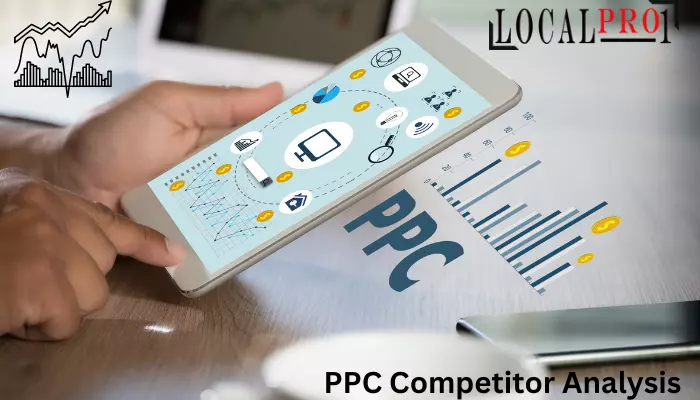Local SEO Services Near Me | Local Pro1 Welcome to...
Decoding Success: A Guide to Effective PPC Competitor Analysis
Decoding Success: A Guide to Effective PPC Competitor Analysis
Competitive analysis for Pay-Per-Click (PPC) advertising is an essential part of any digital marketing plan. Knowing what your rivals are doing in the ever-changing world of online advertising can give you useful information to improve your own PPC efforts. This process involves evaluating and analyzing the strategies, keywords, and performance of competitors in the same advertising space. Local Pro1 provides the best service of PPC Competitor Analysis.

Definition of PPC Competitor Analysis
- Explanation of PPC (Pay-Per-Click) Competitor Analysis
- Focus on examining strategies, tactics, and performance of competitors in the PPC landscape.
Importance of PPC Competitor Analysis
- Highlighting the significance of staying informed about competitors in the digital advertising space.
- Preview of the benefits, such as improved campaign effectiveness and strategic insights.
What is PPC Analysis?
Overview of PPC (Pay-Per-Click):
With the pay-per-click online advertising strategy, marketers are charged a fee each time one of their ads is clicked. It’s a method of purchasing website visits as opposed to obtaining them naturally.
Components of PPC Analysis:
Keyword Analysis:
Evaluate the effectiveness of chosen keywords in driving relevant traffic.
Identify high-performing keywords and eliminate or optimize low-performing ones.
Consider keyword match types (broad match, phrase match, exact match) for better targeting.Monitor keyword relevance to ad content writing landing pages.
Ad Copy Analysis:
Assess the performance of ad copies in terms of click-through rate (CTR) and conversion rates.
Try out many ad versions to find the most persuasive messaging.
Ensure that ad copies align with targeted keywords and provide clear calls-to-action.
Consider the use of ad extensions for additional information.
Landing Page Analysis:
Evaluate the relevance and quality of landing pages to the ad and keywords.
Analyze the page load speed and overall user experience.
Ensure a clear and compelling call-to-action on the landing page.
Implement A/B testing to optimize landing page elements for better conversions.
Budget and Bidding Analysis:
Review the budget allocation across different campaigns and ad groups.
Adjust bids to achieve a balance between visibility and cost-effectiveness.
Monitor the performance of campaigns against budget constraints.
Consider the use of ad scheduling and bid adjustments based on performance trends.
How Do You Do a Competitor Analysis?
Identify Competitors:Begin by identifying who your main competitor paid search are in the PPC landscape. These are businesses targeting similar keywords or audience segments.
Analyze Competitor Ad Copies:Review your competitors’ ad copies to understand their messaging, value propositions, and calls to action. Identify patterns in language and formatting.
Evaluate Competitor Keyword Strategies:Examine the keywords your competitors are targeting. This includes both broad and specific terms. Identify high-performing keywords and assess how well they align with your own strategy.
Assess Competitor Landing Pages:Analyze the landing pages that your competitors are directing users to from their ads. Evaluate the relevance, user experience, and conversion elements on these pages.
Examine Budget and Bidding Strategies:Gain insights into your competitors’ budget allocation and bidding strategies. Understand how aggressive or conservative they are in their approach.
Tools and Resources for PPC Competitor Analysis:
Google Ads Competitor Analysis Tools:
Auction Insights: Within Google Ads, use Auction Insights to see how your performance compares to that of your competitors.It offers information on overlap rate, average position, and impression share.
Google Keyword Planner: This tool helps you identify relevant keywords and provides insights into the competition for those keywords.
Third-Party PPC Analysis Platforms:
SEMrush: Offers comprehensive insights into competitors’ and strategies, keywords, and ad copies. It also provides historical data and trends.
SpyFu: Allows you to view your competitors’ most profitable keywords, ad history, and budget estimates.
AdBeat: Provides competitive intelligence on display and mobile advertising, including data on ad creatives and landing pages.
Importance of Competitor Analysis for PPC:
Enhancing Campaign Effectiveness:
You can learn what tactics your rivals are using by studying them; then, you can apply those learnings to your own advertising efforts.By learning about their successful ad placements, targeting strategies, and keywords, you can make your own plan work better.
Uncovering Opportunities and Threats:
Competitor analysis helps you identify market gaps and areas where your competitors may be weak.This allows you to counter potential threats and seize opportunities, ensuring that your PPC campaigns are effectively positioned in the market.
Improving Ad Copy and Creatives:
You may learn about good message and design by analyzing the ad copy and creatives of your rivals. You may use this information to improve the quality of your own advertisements and make sure they appeal to your target market.
Optimizing Budget Allocation:
Competitor analysis aids in understanding how much your competitors are investing in PPC Management and where they are allocating their budgets.
Staying Ahead in the Competitive Landscape:
You may remain up to date on changes in your competitors’ strategies, the introduction of new products, and changes in consumer behavior by keeping a close eye on them. This awareness enables you to adapt your PPC campaigns promptly, staying ahead in the dynamic and competitive online landscape.
Conclusion
PPC competitor analysis is one of the key components of digital marketing.Our own pay-per-click advertising may be significantly impacted by the valuable lessons we have learnt from closely examining the strategies, benefits, and drawbacks of our rivals. Feel free to contact us for any type of query or the services related to PPC Competitor Analysis.
FAQs
What Is Ppc Competitor Analysis?
PPC competitor analysis involves evaluating and scrutinizing the strategies and performance of competitors in the realm of pay-per-click advertising to gain insights and enhance one’s own PPC campaigns.
Why Is Ppc Competitor Analysis Important?
It is crucial for understanding market dynamics, identifying opportunities, and refining your PPC strategy. By analyzing competitors, you can make informed decisions to stay competitive and maximize the effectiveness of your campaigns.
How Do I Conduct Ppc Competitor Analysis?
Start by identifying your main competitors, analyze their ad copy, keywords, and landing pages. Utilize tools like Google Ads Auction Insights and third-party platforms for a comprehensive evaluation.
What Information Can I Gather From Ppc Competitor Analysis?
You can gather insights into competitor keywords, ad copy effectiveness, budget allocation, targeting strategies, and overall market positioning.
How Often Should I Perform Ppc Competitor Analysis?
It’s advisable to conduct PPC competitor analysis regularly, especially when there are significant market changes or shifts in your industry. Quarterly assessments are a good starting point, but more frequent analyses may be necessary in dynamic markets.
Our Services
Our Latest Posts
PPC White Label Services by Local Pro1 | Expert Solutions
PPC White Label Services by Local Pro1 | Expert Solutions...



